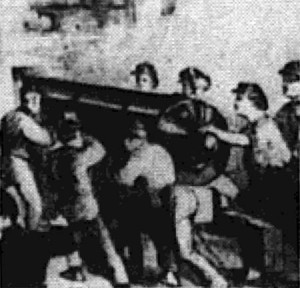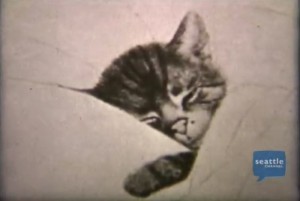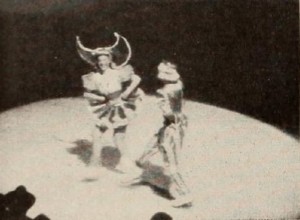Hortobagy is a strange title, but only because the film comes from Hungary. Szilagyi Attila of Hungary shows us the plains of his country and the life of the Hungarian Cowboy and the Hungarian Sheepherders. The film is in black-and-white and is a very interesting 16 minutes about people, costumes, and a land that very few of us have an opportunity to see. The filming is well done and the sound track is in Hungarian," PSA Journal, Mar. 1970, 43.

"Using the moving camera technique, the audience is carried from the first, hesitant beginnings of the Civil War, through the major campaigns, to the inevitable ending of this bloodiest of all American conflicts. Using old wood block prints for his pictorial material, Edward McCarthy has done a remarkable job of breathing life into this segment of history" PSA Journal, Oct. 1963, 41.

"The 1938 Seattle film, shot by Iwao Matsushita, features chubby cats playing, eating, and being cuddled by their humans." K5 News.
"Contrasts life in Belgian Congo under Belgian colonial government to that of tribal rule." National Archives.
"Scenes before a hunt in Gisburn village of the riders and hounds waiting to set off, showing John and Harold Hindley mounted. Also stable scenes at the Ribblesdale Arms, Gisburn, including Rosemary and Valerie saddling their ponies. The hunt out and about on country lanes and riding across fields at Worston, near Clitheroe. John Hindley and daughter Val sitting by the fireside in 1947. A Pony Club Rally on Gisburn Park estate. Hunter Trials, possibly at Gisburn. Lawn Meet of Pendle Forest and Craven Hunt at Gisburn Park. Interior scenes of guests at the buffet, before the hunt moves off in frosty weather." (NWFA Online Archive)
"B. Fredric de Vriew of Rochester, N. Y., for his picture 'Hunting With a Camera Instead of a Gun.' This picture was made practically in its entirety at the zoo." American Cinematographer, Feb. 1936, 73.

"Filming indoor spectacles is difficult, but it is made doubly so when the staging, actors and lighting facilities are in a constant state of flux. Yet Oscar H. Horovitz, in his Ice Follies 1947, has solved these problems with technical perfection. Points of filming vantage are carefully chosen, from which sequences of the major acts and personalities are imaginatively recorded. An intelligent use of varying focal length lenses contributes the near shots and closeups so necessary to a well rounded study of this kind. Mr. Horovitz more than maintains his position as one of the master craftsmen in his chosen field." Movie Makers, Dec. 1947, 538.
"Un-staged documentary footage shot and edited by Sallie Wagner. Sallie's description of the film: 'Jimmy Hill flagging train at Chambers, Arizona, Post Office at Chambers, Bob Cassidy Postmaster, plane drop at Wide Ruins, Bill Cousins picking up package. Wide Ruins trading post exterior and interior, Bill and Sallie, Bill's office is original trading post of Day Brothers, Bill Cousins at front of airplane, crash of transcontinental racer on highway. Square dance, Eleanor Pratt in blue blouse near ladder, Jack Norton heavy set fellow, Phil Pratt extreme left, John Adair with back to screen, Dick Tryon [Tyron?] near rocks. Dwight Wagner - white shirt and tie near rose bush, Sallie in front of Spring house'." New Mexico State Archives.
Total Pages: 79